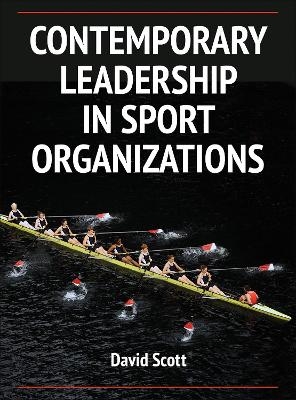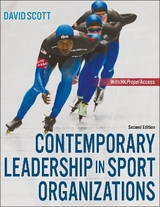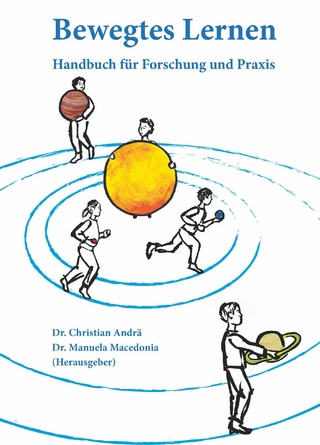
Contemporary Leadership in Sport Organizations
Human Kinetics (Verlag)
978-0-7360-9642-3 (ISBN)
- Titel erscheint in neuer Auflage
- Artikel merken
Contemporary Leadership in Sport Organizations blends research on leadership with practical application of the skills and knowledge that students will need on the job. This text provides sport management students with a comprehensive understanding of the complex topic of leadership in sport through a presentation of foundational and contemporary research, numerous practical examples and analytical exercises, and thought-provoking self-assessments and quotes.
More than leadership tips from a sport personality, Contemporary Leadership in Sport Organizations translates classic and contemporary research in leadership into leadership skills and behaviors that are useful in present-day sport settings. Synopses of research findings are presented in table format for an accessible approach to understanding the three Rs of leadership: relationships, results, and responsibility. In addition, a variety of learning features reinforce content:
· Practical examples provide opportunities to critically consider the concepts under discussion.
· Chapter-opening objectives, as well as pre- and postchapter self-assessments, help students measure their understanding of chapter content.
· Specific examples and case studies applicable to a broad range of sport leadership roles put research into practice.
· On the Sidelines stories, Your Thoughts boxes, and questions at the end of chapters are incorporated throughout the book to provide examples and stimulate discussions applicable to a broad range of sport leadership roles across youth, amateur, intercollegiate, professional, and commercial sport organizations.
Part I of the text offers a leadership primer, introducing the elements of business and educational environments in which sport organizations operate. Students will learn how leaders in sport organizations typically assume both managerial and leadership roles and how these roles integrate and diverge, and they will review the historical foundation and evolution of leadership theories from the academic literature. Part II covers applied leadership thought and action and how leaders can become more effective in addressing critical challenges of the present and future. Key topics such as decision making, organizational change, emotional intelligence, vision, strategic planning, and crisis management are discussed. Professional growth and development are the focus of part III, considering multiple approaches and tools for improving self-understanding, personal development, and leadership mentoring.
Contemporary Leadership in Sport Organizations provides a foundational and contextualized body of information regarding thought and practice in leadership to inform and inspire students of sport management. Whether preparing for leadership roles in sport organizations or preparing for teaching, research, and academic study in the field of sport leadership, students will gain a solid understanding of the theoretical foundations of leadership in sport and how it is applied to sport-related organizations of all types and sizes.
David Scott, EdD, is associate dean for research and information management in the college of education at the University of New Mexico. He received his bachelor of science in physical education from Texas A&M University, his master of science in physical education from Midwestern State University, and his doctor of education in physical education with specialization in sport administration from the University of Northern Colorado. Scott began his career as a teacher and coach of multiple sports in public schools and eventually coached intercollegiate football at the NAIA and NCAA Division II level. His university teaching has included undergraduate and graduate courses in exercise science; sport leadership; organizational theory for sport; administration of sport personnel; public relations in health, physical education, and health; principles of coaching; and management concepts for sport and fitness. He has also advised numerous doctoral dissertations, graduate students in sport administration, athletes, and undergraduate physical education majors. Scott’s research emphasis is leadership and organizational behavior in sport organizations, with a secondary interest in predictive data mining for sport management. He also has an interest in coaching and athletic administration education and conducts workshops dealing with various aspects of leadership and management training for coaches and athletic administrators. He has published research and conceptual articles in several refereed journals, including Journal of Sport Management, Quest, International Journal of Sport Management, International Journal of Sport Management & Marketing, and Journal of Contemporary Athletics. He has also published several book chapters and has presented at multiple state, national, and international conferences. Scott is a member of the North American Society for Sport Management and the American Alliance for Health, Physical Education, Recreation and Dance. In his free time, Scott enjoys trail running with his Alaskan malamutes, racquetball, tennis, hiking, and trout fishing.
Part I. A Leadership Primer
Chapter 1. A Leadership Primer
Defining Leadership
Settings for Leadership in Sport Organizations
Management and Leadership: Mutually Exclusive or Integrated?
Levels of Analysis in Leadership
Additional Frameworks for Understanding Leadership
Historical Leadership Theory and Research
Foundational Research in Sport Leadership
Contemporary Leadership Thought: What We Have Learned
Summary
Chapter 2. Results, Relationships, and Responsibility
Results
Relationships
Responsibility
Summary
Part II. Contemporary Thought in Leadership Applications for Sport Organizations
Chapter 3. Emotional Intelligence and Leadership
Defining Emotional Intelligence
Why Is EI Important for Sport Leaders?
Research and EI
Applying EI in Organizational Leadership
Summary
Chapter 4. Building a Culture of Success
Leadership and Organizational Culture: The Foundation
Research in Sport Organizational Culture
Building a Culture of Success in Sport Organizations
Summary
Chapter 5. Vision and Strategic Leadership
Leadership and Vision in Sport Organizations
Strategic Leadership
Summary
Chapter 6. Complexity and Problem Solving
Changing Environment for Leadership
Competencies and Skills for Creative Problem Solving
Sources of Complex Problems in Sport Organizations
Approaches to Problem Solving
Summary
Chapter 7. Change, Turnaround, and Crisis Leadership
Change Leadership
Turnaround Leadership
Crisis Leadership
Summary
Chapter 8. Diversity Leadership
Defining Diversity
Perspectives on Gender, Culture and Nationality
Surface-Level versus Deep-Level Diversity
Diversity Representation and Embracing Diversity
Diversity Representation in Sport
Organizational Leadership and Diversity
Women and Special Populations in Sport
Leadership Competencies and Diversity
Summary
Chapter 9. Globalization and Leadership
Terminology and Forms of Globalization
Globalization in a Sport Context
Globalization and Leadership
Summary
Part III. Developing Sport Leaders of the Future
Chapter 10. Leadership Learning and Development
Perspectives on Leadership Development
How Do We Learn to Lead?
Leadership Learning Applied
Planning and Implementing Leadership Development
Summary
Chapter 11. Future Considerations
Leadership Skills of the Future
Sport Organizations as Learning Organizations
Case Studies
Final Thoughts
| Erscheint lt. Verlag | 3.3.2014 |
|---|---|
| Verlagsort | Champaign, IL |
| Sprache | englisch |
| Maße | 216 x 279 mm |
| Gewicht | 953 g |
| Themenwelt | Sachbuch/Ratgeber ► Sport |
| Wirtschaft | |
| ISBN-10 | 0-7360-9642-6 / 0736096426 |
| ISBN-13 | 978-0-7360-9642-3 / 9780736096423 |
| Zustand | Neuware |
| Haben Sie eine Frage zum Produkt? |
aus dem Bereich



